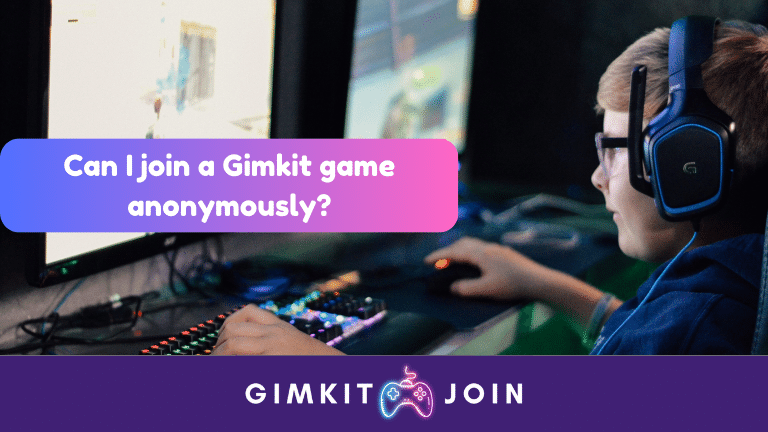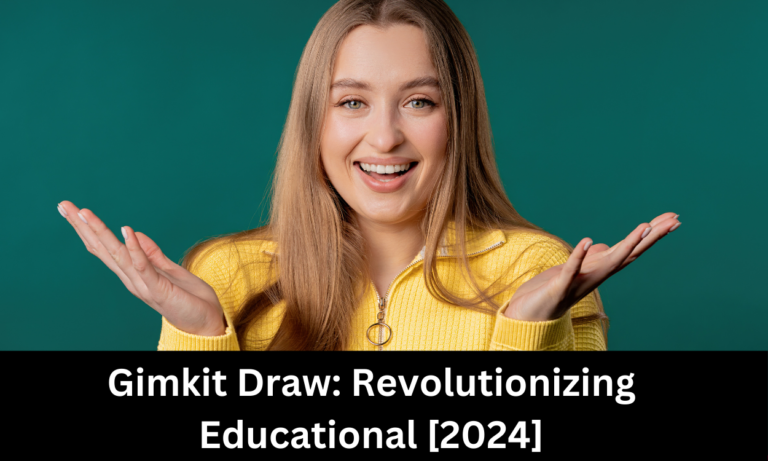Can I join a Gimkit game anonymously?
Can I join a Gimkit game anonymously? As educational platforms like Gimkit gain popularity, students and parents alike may wonder about the possibility of participating anonymously in game-based learning activities. This comprehensive guide will explore the concept of anonymous participation on Gimkit, addressing the various considerations, benefits, and potential drawbacks associated with this approach.
Understanding Anonymous Participation on Gimkit
Before delving into the specifics of joining Gimkit join games anonymously, it’s crucial to understand what anonymous participation entails and how it differs from other modes of engagement on the platform.
Definition of Anonymous Participation
Anonymous participation on Gimkit refers to the ability to join and engage in game sessions without providing any personally identifiable information (PII) or creating a user account. In this mode, participants are typically assigned a randomly generated identifier, such as a number or a code, which is used to distinguish them from other players during the game session.
This level of anonymity can be particularly attractive to individuals who value their privacy or wish to participate in educational activities without revealing their identities.
Contrasting Anonymous Participation with Other Modes
Gimkit offers various modes of participation, each with its own level of privacy and identification requirements. These include:
- Registered User Account: Creating a registered user account on Gimkit typically requires providing some personal information, such as a username, password, and (optionally) an email address or other basic details.
- Guest Mode: Gimkit allows users to join game sessions as guests, where they can enter a nickname or temporary username that is visible to others in the game session. However, no additional personal information is required, and the guest account is temporary, lasting only for the duration of the game or quiz.
- Anonymous Mode: This is the highest level of privacy offered by Gimkit, where participants can join game sessions without providing any personally identifiable information or creating an account. They are assigned a randomly generated identifier for the duration of the game session.
The anonymous mode offers the highest level of privacy and anonymity, making it an attractive option for those who prioritize maintaining their privacy while engaging in educational activities on Gimkit.
Benefits of Joining Gimkit Games Anonymously
Participating in Gimkit games anonymously can offer several benefits, catering to the diverse needs and preferences of users. Here are some of the key advantages of anonymous participation:
Privacy and Anonymity
The most obvious benefit of joining Gimkit games anonymously is the preservation of privacy and anonymity. By not providing any personally identifiable information, participants can engage in game-based learning activities without revealing their identities or personal details.
This level of anonymity can be particularly valuable for individuals who value their privacy or have concerns about data privacy and online security. It allows them to participate in educational activities without compromising their personal information or digital footprint.
Reduced Pressure and Anxiety
For some students, the prospect of participating in educational activities under their real names or identities can lead to increased pressure, anxiety, or self-consciousness. Anonymous participation on Gimkit can help alleviate these concerns by creating a more relaxed and stress-free environment.
Without the need to worry about their performance or achievements being directly linked to their identities, students may feel more comfortable taking risks, exploring new concepts, or engaging in friendly competition without fear of judgment or scrutiny.
Privacy for Sensitive or Personal Topics
In certain educational contexts, the subject matter or topics being explored may be sensitive or personal in nature. Anonymous participation on Gimkit can provide a safe and comfortable space for students to engage with these topics without the risk of their identities being associated with the content or discussions.
This level of privacy can foster more open and honest dialogue, allowing students to express themselves freely and fully engage with the learning material without fear of potential repercussions or stigma.
Protection from Bullying and Harassment
Unfortunately, bullying and harassment can occur in educational settings, including online platforms. Anonymous participation on Gimkit can serve as a protective measure for students who may be vulnerable to such behavior.
By participating anonymously, students can engage in game-based learning activities without revealing their identities, reducing the risk of being targeted or identified by potential bullies or harassers.
Increased Engagement and Participation
For some individuals, the prospect of anonymous participation can actually increase their willingness to engage and participate in educational activities. By removing the potential for judgment or scrutiny based on their identities, students may feel more comfortable actively participating, asking questions, or expressing their opinions and ideas.
This increased engagement can lead to a more enriching and effective learning experience, as students are able to fully immerse themselves in the educational content without external distractions or self-consciousness.
Potential Drawbacks and Limitations
While anonymous participation on Gimkit offers several benefits, it’s important to acknowledge and address potential drawbacks and limitations associated with this approach. Here are some considerations to keep in mind:
Limited Progress Tracking and Personalization
One of the primary limitations of anonymous participation on Gimkit is the inability to track individual progress or receive personalized recommendations and feedback. Without a registered user account, the platform cannot associate game performance, achievements, or learning progress with a specific individual.
This can potentially limit the effectiveness of Gimkit’s personalized learning features, which are designed to tailor the educational experience based on a user’s strengths, weaknesses, and learning preferences.
Lack of Leaderboard and Achievement Recognition
Gimkit incorporates gamification elements, such as leaderboards and achievements, to foster friendly competition and motivation among participants. However, these features may be limited or unavailable for anonymous participants, as they require the ability to track and associate individual performance with a specific user account.
While this may not be a concern for all users, some students may find the lack of recognition and competitive elements to be demotivating or less engaging.
Potential for Abuse and Misuse
While anonymous participation can offer privacy benefits, it also opens the door for potential abuse and misuse of the system. Without any accountability or identification measures in place, individuals could potentially create multiple anonymous identities or engage in disruptive or inappropriate behavior without consequence.
To mitigate these risks, Gimkit and educators may need to implement additional safeguards or moderation measures to ensure a safe and respectful learning environment for all participants.
Limited Collaborative and Social Features
Certain collaborative or social features within Gimkit games may be restricted or operate differently for anonymous participants. For example, group assignments, team-based activities, or communication tools may require some level of identification or account creation to function properly.
This limitation could potentially impact the overall learning experience, particularly in educational contexts that emphasize collaborative learning or social interaction among students.
Compliance and Regulatory Considerations
Depending on the educational institution or jurisdiction, there may be compliance or regulatory requirements that could impact the use of anonymous participation on educational platforms like Gimkit.
For example, some schools or districts may have policies or guidelines that mandate the collection and retention of certain student data or require parental consent for online activities. Anonymous participation could potentially conflict with these requirements, necessitating additional considerations or alternative arrangements.
Implementing Anonymous Participation on Gimkit
If you’re an educator or game host considering implementing anonymous participation options for your Gimkit games, there are several factors to consider and best practices to follow. Here are some key considerations:
Game Settings and Configurations
Gimkit may offer specific settings or configurations that allow game hosts to enable anonymous participation mode for their game sessions. It’s essential to familiarize yourself with these settings and ensure that they are properly configured to maintain the desired level of anonymity and privacy for participants.
Additionally, you may need to communicate these settings and any associated limitations or restrictions to participants to ensure a clear understanding of the anonymous participation experience.
Moderation and Monitoring
While anonymous participation can offer privacy benefits, it’s crucial to implement appropriate moderation and monitoring measures to maintain a safe and respectful learning environment. This may involve actively monitoring game sessions for inappropriate behavior, enforcing rules and guidelines, and having the ability to remove or block disruptive anonymous participants if necessary.
Clear communication of these moderation efforts and the consequences for misuse can help deter potential abuse and ensure a positive experience for all participants.
Balancing Privacy and Accountability
Striking the right balance between privacy and accountability is essential when implementing anonymous participation options. While prioritizing privacy is important, it’s also necessary to have measures in place to hold participants accountable for their actions and behavior within the educational context.
This could involve implementing temporary bans or restrictions for anonymous participants who violate rules or engage in disruptive behavior, or implementing reporting mechanisms for other participants to flag problematic conduct.
Consent and Age Considerations
Depending on the educational setting and the ages of the participants, there may be consent or age-related considerations to address when implementing anonymous participation options. In some cases, parental consent or oversight may be required for minors engaging in online educational activities, even if they are participating anonymously.
It’s essential to consult relevant policies, regulations, and best practices to ensure compliance and protect the well-being of all participants, particularly those who are underage or part of vulnerable populations.
Integration with Other Educational Tools
In many educational settings, Gimkit is likely to be used in conjunction with other digital tools, platforms, or learning management systems. When implementing anonymous participation options, it’s important to consider how this might impact the integration and interoperability between Gimkit and these other tools.
For example, if certain features or functionalities require user authentication or account linking, anonymous participation on Gimkit could potentially create compatibility issues or limitations. It’s essential to thoroughly evaluate and test these integrations to ensure a seamless and cohesive learning experience for all participants, regardless of their chosen participation mode.
Ethical Considerations for Anonymous Participation
While anonymous participation on Gimkit can offer privacy benefits, it’s crucial to approach this feature with ethical considerations in mind. Here are some key ethical principles to uphold when implementing or engaging in anonymous participation:
Respect for Privacy and Consent
Respecting individual privacy and consent should be a fundamental principle when implementing anonymous participation options. Participants should have the choice to participate anonymously without coercion or pressure to reveal their identities.
Additionally, any data or information collected during anonymous participation should be handled with utmost care and respect for privacy, adhering to relevant data protection regulations and best practices.
Fostering an Inclusive and Safe Environment
Anonymous participation should not be used as a means to enable or encourage harmful, discriminatory, or unethical behavior. Educators and game hosts should strive to foster an inclusive and safe learning environment, where all participants feel respected and valued, regardless of their chosen participation mode.
Clear rules, guidelines, and moderation measures should be in place to address any instances of bullying, harassment, or other unacceptable conduct, whether from identified or anonymous participants.
Academic Integrity and Fair Assessment
In educational contexts where assessment or grading is involved, anonymous participation can introduce challenges in maintaining academic integrity and fair evaluation practices. Educators should carefully consider how to balance the privacy benefits of anonymous participation with the need for reliable and equitable assessment methods.
Potential strategies could include implementing secure and anonymous assessment protocols, leveraging technology-assisted proctoring, or implementing temporary identification measures solely for the purpose of assessment, while maintaining anonymity during regular learning activities.
Transparency and Open Communication
Transparency and open communication about the implementation and use of anonymous participation options are essential. Educators and game hosts should clearly communicate the rationale, benefits, and potential limitations of anonymous participation to all stakeholders, including students, parents, and educational authorities.
Additionally, participants should be informed about any data collection practices, moderation measures, or potential limitations associated with anonymous participation, allowing them to make informed decisions about their engagement.
Continuous Evaluation and Improvement
As with any educational technology or approach, the implementation and use of anonymous participation on Gimkit should be continuously evaluated and improved based on feedback and real-world experiences.
Educators and game hosts should solicit input from participants, analyze the effectiveness and potential issues or challenges, and make adjustments as needed to ensure that anonymous participation remains a valuable and ethical tool for enhancing the learning experience.
By upholding these ethical principles and considerations, educators and game hosts can ensure that anonymous participation on Gimkit is implemented and utilized in a responsible and ethical manner, prioritizing the well-being, privacy, and educational outcomes of all participants.
Best Practices for Students Participating Anonymously
If you’re a student considering participating anonymously in Gimkit games, there are several best practices and guidelines to follow to ensure a positive and productive learning experience. Here are some key recommendations:
Understand the Limitations and Restrictions
Before engaging in anonymous participation, make sure you thoroughly understand the limitations and restrictions associated with this mode of participation. Be aware of any limitations in progress tracking, personalization, leaderboard recognition, or collaborative features that may be affected by anonymous participation.
Manage your expectations accordingly and be prepared to potentially miss out on certain features or functionalities that require account registration or identification.
Follow Rules and Guidelines
Even when participating anonymously, it’s essential to follow all rules, guidelines, and codes of conduct established by your educator or the game host. Anonymity should not be used as a excuse for disruptive, inappropriate, or unethical behavior.
Respect the learning environment and the rights of other participants, whether they are participating anonymously or with identified accounts.
Maintain Academic Integrity
In educational contexts where assessments or graded activities are involved, it’s crucial to maintain academic integrity even when participating anonymously. Avoid any form of cheating, plagiarism, or unauthorized collaboration, as these actions undermine the learning experience and can have serious consequences.
If you are unsure about the expectations or guidelines for a particular activity, it’s always better to seek clarification from your educator rather than risking academic misconduct.
Be Mindful of Privacy and Data Protection
While anonymous participation can help protect your privacy, it’s important to remain mindful of any personal information or data that may be shared or collected during the learning activities.
Avoid sharing sensitive or identifying information, even inadvertently, as this could compromise your anonymity or the privacy of others. If you have concerns about data privacy or protection, consult with your educator or the appropriate authorities.
Engage Actively and Constructively
Anonymous participation should not be seen as a barrier to active and constructive engagement in the learning process. Embrace the opportunity to participate freely and without fear of judgment, asking questions, exploring new ideas, and contributing to discussions or collaborative activities.
However, ensure that your engagement remains respectful, constructive, and aligned with the educational objectives and guidelines set by your educator.
Provide Feedback and Suggestions
If you have feedback, suggestions, or concerns regarding the implementation or use of anonymous participation on Gimkit, share them with your educator or the appropriate authorities. Your input can help shape and improve the experience for all participants, ensuring that anonymous participation remains a valuable and effective tool for enhancing the learning experience.
By following these best practices, you can maximize the benefits of anonymous participation on Gimkit while upholding ethical standards, maintaining academic integrity, and contributing to a positive and productive learning environment for yourself and your peers.
Exploring Alternative Privacy-Focused Educational Tools
While Gimkit offers the option for anonymous participation, it’s important to recognize that it may not be the only educational platform or tool that prioritizes privacy and anonymous engagement. As technology continues to evolve, alternative solutions and platforms may emerge, offering different approaches to privacy-focused learning experiences.
One potential alternative is the use of decentralized or blockchain-based educational platforms, which aim to provide increased privacy, security, and user control over personal data. These platforms often employ advanced cryptographic techniques, distributed ledgers, and decentralized architectures to minimize the collection and storage of personal information while facilitating secure and anonymous interactions.
Another area of exploration could be the integration of privacy-enhancing technologies, such as secure multi-party computation (MPC), homomorphic encryption, or zero-knowledge proofs, into existing educational platforms. These technologies enable secure and privacy-preserving data processing, allowing users to engage in educational activities without revealing sensitive information or compromising their privacy.
Additionally, some educational institutions or organizations may develop their own custom solutions or platforms specifically designed with privacy and anonymity in mind. These solutions could leverage cutting-edge privacy technologies, implement strict data protection policies, and prioritize user control and consent over personal information.
As the demand for privacy and data protection continues to grow, it’s likely that more innovative solutions and platforms will emerge to cater to the needs of privacy-conscious learners and educators. Staying informed about these developments and exploring alternative options can help ensure that you have access to educational experiences that align with your privacy preferences and values.
Conclusion
In the digital age of education, where online platforms and game-based learning are becoming increasingly prevalent, the ability to participate anonymously can be a valuable option for many students and educators. Gimkit, a popular game-based learning platform, recognizes this need and offers the capability for anonymous participation in its game sessions.
While anonymous participation on Gimkit offers several benefits, such as privacy preservation, reduced pressure and anxiety, and protection from potential bullying or harassment, it also comes with potential drawbacks and limitations. These include limited progress tracking, lack of personalization, restricted collaborative features, and potential abuse or misuse.
Implementing anonymous participation options on Gimkit requires careful consideration of game settings, moderation measures, consent and age requirements, and integration with other educational tools. Educators and game hosts must also uphold ethical principles such as respect for privacy and consent, fostering an inclusive and safe environment, maintaining academic integrity, transparency, and continuous evaluation and improvement.
For students considering anonymous participation, it’s essential to understand the limitations and restrictions, follow rules and guidelines, maintain academic integrity, be mindful of privacy and data protection, engage actively and constructively, and provide feedback and suggestions for improvement.
As technology continues to evolve, alternative privacy-focused educational tools and platforms may emerge, offering different approaches to anonymous and secure learning experiences. Exploring these options can help ensure that students and educators have access to educational experiences that align with their privacy preferences and values.
Ultimately, the ability to participate anonymously in educational activities like Gimkit games can empower individuals to engage in learning without compromising their privacy or feeling pressured to reveal their identities. By embracing this option responsibly.

FAQs
Can I join a Gimkit game without revealing my real name?
Answer: Yes, you can join a Gimkit game without using your real name. Participants are usually required to enter a nickname or a pseudonym when joining a game, which allows you to remain anonymous.
Do I need to provide any personal details to participate in a Gimkit game anonymously?
Answer: No, you do not need to provide personal details like email or phone number to participate in a Gimkit game. The only necessary information is the game code and a nickname of your choice.
Is my activity tracked in Gimkit if I join anonymously?
Answer: While your activity within the game, such as scores and responses, is tracked for the duration of the game session to facilitate gameplay, your identity remains unknown if you use a nickname. Gimkit does not track personal information of anonymous participants beyond the game itself.
Can I still earn points or rewards if I join a Gimkit game anonymously?
Answer: Yes, you can earn points and compete in the game just like any other participant. However, if the game involves accumulating points or rewards over multiple sessions, you might need to use the same nickname consistently or sign up for an account to preserve your progress.
What happens if I disconnect from a Gimkit game when playing anonymously? Can I rejoin?
Answer: If you get disconnected, you can rejoin the game using the same game code and by entering the same nickname. Make sure to re-enter quickly to continue where you left off, as the game progresses in real-time.




